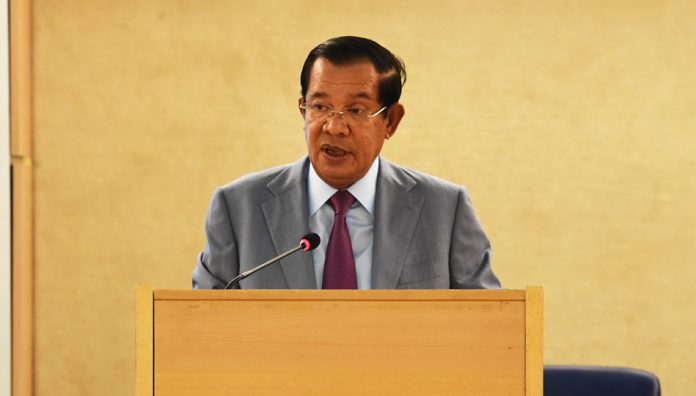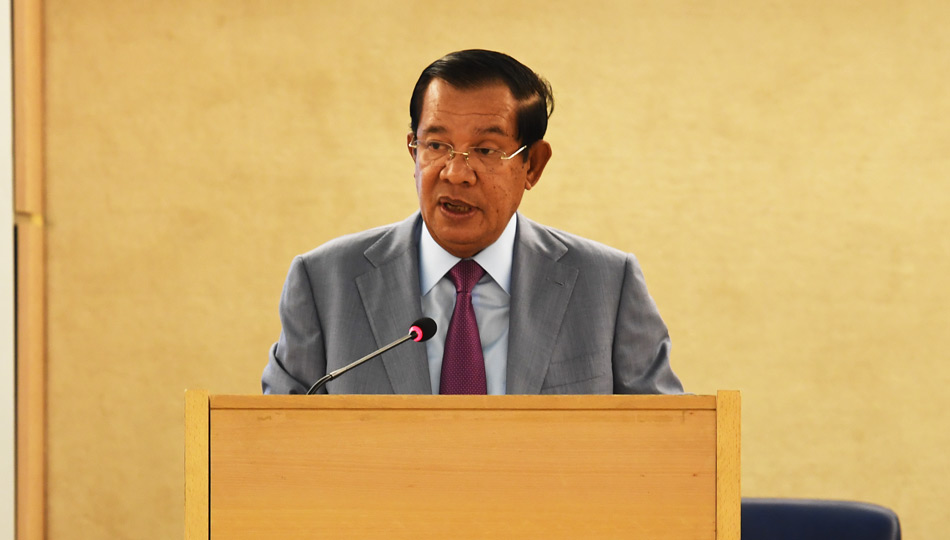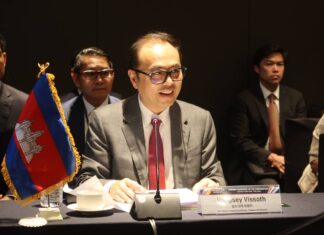Excellency President,
Excellency High Commissioner,
Excellencies, Ladies and Gentlemen,
Today, I am delighted to participate in the 41st Session of Human Rights Council to shed light on what is actually happening in Cambodia regarding Human Rights, Civil Society and particularly on democratic process. It is quite often observed that, Cambodia reported on media is different to Cambodia in reality, and sometimes is Completely portrayed in opposite way.
To start, please allow me to share with you about Cambodia’s recent history. Cambodia’s modern history went through a number of disastrous episodes from Indochina War 1970 1975 to the Pol Pot genocide regime 1975-1979, resulting in a complete destruction to the root of national socio-economic infrastructure. As you might be well aware, during these tumultuous periods particularly during the Khmer Rouge regime, the rights of Cambodian people were entirely abolished, even rights to life. Despite the end of the Pol Pot regime on 7th January 1979, the civil war in Cambodia still raged. Being in the situation of “War and Peace at the same time“, Cambodia, at the same time, used one hand to prevent the return of the genocide regime, and the other hand to rebuild and develop the country from ashes, while facing unfair trade embargoes and economic sanctions imposed by those that always preached about humanity, human rights and democracy.
Even though after the signing of the Paris Peace Accord in 1991 and first election held in 1993, organized and supervised by the United Nations Transitional Authority in Cambodia (UNTAC) with the budget of about USD 2 billion, civil war still prolonged. Clearly, building a nation cannot be done in the midst of constant warfare. This was the reason that led me to adopt and introduce “Win-Win Policy“, which has brought about to Cambodia, for the first time in her modern history, the complete end of war, peace, national reconciliation and a full national unification in late 1998. I would also like to emphasis that this peace was achieved by Cambodia herself, neither bloodshed nor weapon and ammunition were used, and without external order or support.
Indeed, peace has opened-up opportunities for development in all areas. Cambodia, previously plagued by war, devastation, territorial division and insecurity throughout the country, has now become a country with full peace, a unified and secure nation, and one of the attractive tourist destinations in the region and in the world. The people of Cambodia, as a family, a community and a society, now live in peace and harmony. Cambodia, previously known as Killing Field, dominated by authoritarianism and horrific genocide, has transformed herself to the land of freedom with an adherence to the principles of liberal multi-party democracy, by regularly holding free, fair and just elections; and has become a state governed by the rule of law whose citizens enjoy equal treatment before the law. Cambodia that was previously looked down upon and politically and economically isolated, is now a sovereign state of full independence and territorial integrity, and has actively integrated herself into regional and international architecture, as well as playing active role on an equal footing on regional and international affairs. Previously being a country that received UN peacekeepers, Cambodia has now sent her forces for UN peacekeeping mission in many parts of the world. Perceived as an economically-underdeveloped country in the past, mired in the poverty and serious food insecurity, Cambodia is now a rice-exporting country, ensuring food security, one of the highest and fastest growing economies in the world, and a great performer in terms of poverty reduction and improvement in social indicators. Moreover, Cambodia has successfully graduated herself from low-income to lower middle-income country, and is committed to making further efforts to reach an upper middle-income status by 2030 and a high-income country by 2050.
Excellencies, Ladies and Gentlemen!
Although the full peace and national unity was only restored after 1998, Cambodia has made her utmost efforts after the first general elections held in 1993 to strictly adhere to the principle of liberal multi-party democracy, by regularly holding free, fair and just and transparent elections that allow citizens to choose the country’s leadership. Cambodia has also strived to rebuild the country, through adherence to the principles of rule of law, as a sovereign state of full independence and territorial integrity.
Cambodia held the general election in 2018 in a free, fair and just manner, with 20 registered political parties contesting, and the voter turnout rate was 83.02%, an exceptionally high rate compared to some countries that have long upheld democracy. I would like also to inform that during the election campaign, on the election day and post –election period, the whole process was smooth without any violence or threat – not even a single case. The election process was supervised and monitored by 500 international observers, 80,000 national observers and 9,000 observers from various political parties. Unfortunately, some countries did not send their observers to participate in this process, but issued their statements, alleging that the elections were not held in a free, fair, and just manner. I would like to ask all of you to think how those countries could evaluate an election process once they did not participate or have any observers on the ground?
In a universal norm, democracy must adhere to the rule of law. Implementing a democracy without the rule of law will lead to an anarchy. In this spirit, we wish that all actors in the democratic process act responsibility, provide constructive criticism, not to incite and create hatred between races, not to submit to foreign interests, especially not to sow hatred between Khmer and Khmer, that can lead to the return of civil war. All political parties must be legally and equally accountable before the law. The experiences from destructive wars over the past decades have taught us that, at any cost, Cambodia has to maintain peace and social stability.
Excellencies, Ladies and Gentlemen!
Cambodia is regarded as heaven of non-government organization (NGOs) and some of them have been funded from abroad where the sources have never been reported. There are 5,400 registered NGOs, as of now, including those operating to promote human rights, democracy, local development etc. The Royal Government of Cambodia(RGC) has always treated NGOs as partners for development, especially for developments in local and remote areas; and the RGC wants to see those NGOS abide by the law, openly and frankly engage with the government on challenges for development, do not serve as puppets to foreign interest and create turmoil and insecurity in the country. To further foster genuine partnership, the RGC has regularly organized Consultative Forum with Civil Society Organizations (SCOs) in a constructive manner without discrimination, under the leadership of the Ministry of the Interior and Civil Society Alliance Forum.
Regarding the Freedom of Press, Cambodia has 550 print newspapers, 148 online newspapers, 211 radio stations, 21 TV networks, 113 TV cable channels and 39 press associations. Cambodians have the rights to receive news from all sources and types, and enjoy freedom of expression on every aspect. I have a Facebook Page that is served as a platform for all citizens to directly make comments on my leadership, on challenges for the development at their local communities, the misconduct of government officials and authorities, and other matters. All ministries, institutions and authorities at all levels also have their respective Facebook Pages to receive feedbacks from citizens. In addition, I set up, on a regular and annual basis, a meeting and gathering with media organizations in Cambodia to strengthen the cooperation between the RGC and the media in jointly fighting against corruptions and promoting socio-economic development.
I would like to inform the meeting that in Cambodia, people, regardless of their political tendencies, freely and vigorously express their opinions on various topics. Every day, I receive many feedbacks from my citizens. Instead of not suppressing people’s opinions, the RGC indeed encourages them to express their views, since their comments are regarded as mirror for the assessment of our performance, and serving as inputs to formulate policy and strategy for future developments. As a democratic government, what we need is that all opinions should be expressed in a responsible manner, clearly distinguished between their rights of expression and insults, baseless accusation, slandering, fake news; and the call for rebellion against legitimately elected government which could lead to chaos and destabilization of the society.
Excellencies, Ladies and Gentlemen!
The labor rights, among others, are the ones that are guaranteed under the Constitution of the Kingdom of Cambodia. The RGC has been proactive in introducing various measures to address matters related to labor and union rights. Cambodia has ratified all 8 core conventions and 5 other related conventions, marking Cambodia the only country in ASEAN in ratifying more international conventions on labor in order to ensure that labor rights and working conditions carried out transparently, comprehensively without discrimination, and with the adherence to the rule of law Since January 1999, Cambodia is the first country that has set up a link between working conditions and international trade through agreements for the textile sector between Cambodia and the United States, known later as “Better Factories Cambodia“. The MoU under this scheme will be renewed for the 7th time in the coming October 2019.
In order to be more aware of working conditions and situation of workers, especially to address substantial issues of workers at the factories, I have paid high attention through direct meetings with workers. Since August 2017, I have met with around one million workers. As a result, these direct meetings have brought a lot of benefits to workers. The minimum wage for workers in the textile, garment and footwear industries has increased from USD 80 in 2013 to USD 182 in 2019, together with other additional social security benefits.
As of May 2019, the Ministry of Labor and Vocational Training has registered a total of 5,012 organizations including 4,780 trade unions, 193 union federations, 29 union confederations and 10 employer associations. The Ministry has also set up a working group to organize consultative fora with professional organizations, representatives of employers and employees as well as relevant stakeholders to address their challenges in the implementation of the Trade Union Law, and to further improve this Law as necessary. At the same time, the RGC has established a National Committee to review and to consult with relevant stakeholders and International Labor Organization (ILO) on international conventions which Cambodia has ratified.
Excellencies, Ladies, and Gentlemen!
What I mentioned above are the prominent rights among other rights for human beings that the people of Cambodia are enjoying, resulted from efforts made by the RGC to promote human rights in the country. Cambodia, which went through a horrendous regime that provided no rights at all to the people, are now in a dire need for such rights. With this spirit, the RGC is committed to promoting and protecting human rights. Cambodia clearly understands that respecting human rights, promoting fundamental freedom, adhering to the liberal multi-party democracy, and promoting the rule of law as well as building up these foundations in the society, will certainly continue to bring about peace, stability, harmony and social justice, and will also contribute to sustainable and inclusive development. These have characterized Cambodia as an outstanding country among those complying with Human Rights Conventions. Furthermore, the National Mechanism on Protection and Promotion of human rights is also stated in Chapter 3 of the Constitution of the Kingdom of Cambodia. Cambodia is also a leading and exemplary country, as well as the only country in Asia allowing the United Nations Office of the High Commissioner for Human Rights to open its field Office in the country and has indeed accepted the mandate of Country Special Rapporteur since 1993. So far, we have welcomed 6 country special rapporteurs.
Despite our utmost efforts and numerous achievements, Cambodia has never been commended by groups or institutions with a single political agenda of regime change at any cost. They always accuse the RCG of violating human rights in Cambodia, even though human rights records in their own countries are filled with xenophobia, racial discrimination, mistreatment of immigrants and etc. Furthermore, without hesitation, they apply double standard in evaluating the situation of human rights in Cambodia, with an aim to hinder our developments and damage our country’s reputation.
It is very strange that Cambodia was asked to strengthen her democracy, human rights, and the rule of law; yet when the authority enforced the laws, we were accused of restricting freedom of expression. Worse than this, some of those countries and institutions have taken matters related to human rights as a hostage, when discussing on assistances or economic preferential treatment extended to Cambodia. We are deeply sad to learn that human rights have been used nowadays by some powerful countries as a political tool or as a new operational norm or an excuse for them to interfere in weaker states with sovereignty, full independence and territorial integrity.
Excellencies, Ladies and Gentlemen!
To conclude, I would like to stress that Cambodia remains committed to strengthening close cooperation and constructive partnership with all UN human rights mechanisms and relevant stakeholders in order to further enhance the promotion and protection of human rights in the country. Having said that, we would also like to emphasize that respecting national sovereignty and territorial integrity, non-interference in the internal affairs of states, impartiality and non-selectivity, should be set as guiding principles for all, regardless of small or big countries, in promoting human rights, while taking into account the political, historical and social context of each country. All human rights should be addressed within the global context, with one single standard, through constructive, non-confrontational, non-politicized and dialogue-based approach. In this spirit, I would like to request all stakeholders to consider all issues in a holistic approach, that is to look at the whole forest, instead of one single tree with prejudice towards one’s political agenda.
Thank you






![Facebook Message on the Conclusion of the “Border Infrastructure Fund with a focus on the construction of the border ring road” [Unofficial Translation]](https://pressocm.gov.kh/wp-content/uploads/2024/11/HUN-MANET-01-100x70.jpg)
![Selected Comments of Samdech Techo HUN SEN. President of the Senate, at the solidarity dinner with the Cambodian performance artists football team and the Khmer martial arts team [Unofficial translations]](https://pressocm.gov.kh/wp-content/uploads/2024/11/photo_2024-11-12_11-00-16-100x70.jpg)
